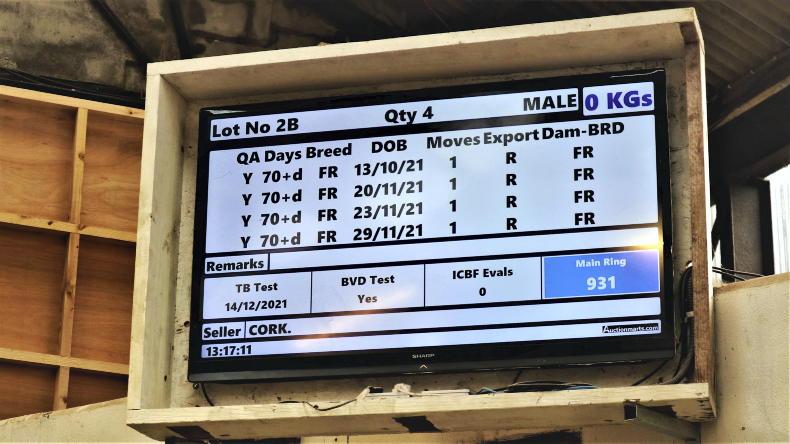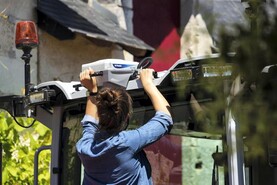Farmer data matters and we need to mind it, said data research engineer at Waterford Institute of Technology (WIT) Kieran Sullivan as he called for greater data awareness within the farming community.
Having researched data taken on farmers and data use by several stakeholders in the farm sector, Sullivan suggested that the Department of Agriculture, Bord Bia and processors could “do a little more” to “respect farmers”.
“Even to send out a letter and say this is why we’re gathering the data and not to hide behind compliance. Be specific and explain exactly what it is being used for. That’d be a great start.
“I don’t think farmers themselves are exposed, but they’re certainly being taken for granted by the whole data gathering scenario. They’re not at all aware of how much data is being held on them. It’s scary how much data is held on each of us,” he said.
Speaking on the example of farmers clicking through ‘tick box’ options for the Beef Data and Genomics Programme (BDGP) on the Irish Cattle Breeding Federation (ICBF) website on cow temperament, milking ability, pneumonia incidences, scour incidences or culling reasons, he said farmers should be told exactly how such information is used and when.
Collective value
The data researcher explained how individual farmer data is “worthless on its own”, but that when gathered and collated by co-ops, processors and State bodies, they use it to market products and track trends.
“Processors are assuming they can take it and do what they like and the farmer is not getting any benefit,” he said.
Sullivan suggested that the spotlight is only shone on this issue at times such as the recent Tirlán data breach concerning its dairy farmer supplier data and Centenary’s cyber attack during the same period.
He claimed many farmers don’t realise yet the trust and responsibility they are affording such companies with their data, only for “the sand to be kicked in their face”.
Climate
However, it’s not all bad, as “without the data, farmers could be accused of all sorts” when it comes to their environmental impact, according to the WIT academic.
Sullivan said that the “onus is on the farmer to show the progress that is being made” when it comes to matters of public concern such as biodiversity, emissions and water quality protection.
He said this is the case “rightly or wrongly”, but that, in his view, it is “wrong”.

Many farmers don’t realise yet the trust and responsibility they are affording companies with their data, says Sullivan.
He suggested that the collection of such data is often not possible unless farmers are in a scheme or EIP as there has to be “financial incentives” and, individually, farmer data has limited value.
‘Tangible’
Sullivan said greater farmer awareness will likely “slowly come in over time” and that the best way to expediate this is through demonstrating the immediate benefit for farmers.

Many farmers don’t realise yet the trust and responsibility they are affording companies with their data, says Sullivan.
Describing data tools such as Moocall, Herdwatch and Flockwatch, the researcher said: “The more automated it is, the better. It won’t be used unless it’s something really tangible, not just for the sake of it.
"Every farmer has enough to do without that. The more we move away from the pen and paper, the easier it gets.”
Read more
Legal view: Tirlán could be fined for data breach
Are we clicking 'yes' to sharing our data too easily?
‘Large number’ of Tirlán suppliers return statements
‘Significant’ number of Tirlán suppliers sent wrong milk statements
Centenary concerned cyber attack compromised ‘main software system’
Farmer data matters and we need to mind it, said data research engineer at Waterford Institute of Technology (WIT) Kieran Sullivan as he called for greater data awareness within the farming community.
Having researched data taken on farmers and data use by several stakeholders in the farm sector, Sullivan suggested that the Department of Agriculture, Bord Bia and processors could “do a little more” to “respect farmers”.
“Even to send out a letter and say this is why we’re gathering the data and not to hide behind compliance. Be specific and explain exactly what it is being used for. That’d be a great start.
“I don’t think farmers themselves are exposed, but they’re certainly being taken for granted by the whole data gathering scenario. They’re not at all aware of how much data is being held on them. It’s scary how much data is held on each of us,” he said.
Speaking on the example of farmers clicking through ‘tick box’ options for the Beef Data and Genomics Programme (BDGP) on the Irish Cattle Breeding Federation (ICBF) website on cow temperament, milking ability, pneumonia incidences, scour incidences or culling reasons, he said farmers should be told exactly how such information is used and when.
Collective value
The data researcher explained how individual farmer data is “worthless on its own”, but that when gathered and collated by co-ops, processors and State bodies, they use it to market products and track trends.
“Processors are assuming they can take it and do what they like and the farmer is not getting any benefit,” he said.
Sullivan suggested that the spotlight is only shone on this issue at times such as the recent Tirlán data breach concerning its dairy farmer supplier data and Centenary’s cyber attack during the same period.
He claimed many farmers don’t realise yet the trust and responsibility they are affording such companies with their data, only for “the sand to be kicked in their face”.
Climate
However, it’s not all bad, as “without the data, farmers could be accused of all sorts” when it comes to their environmental impact, according to the WIT academic.
Sullivan said that the “onus is on the farmer to show the progress that is being made” when it comes to matters of public concern such as biodiversity, emissions and water quality protection.
He said this is the case “rightly or wrongly”, but that, in his view, it is “wrong”.

Many farmers don’t realise yet the trust and responsibility they are affording companies with their data, says Sullivan.
He suggested that the collection of such data is often not possible unless farmers are in a scheme or EIP as there has to be “financial incentives” and, individually, farmer data has limited value.
‘Tangible’
Sullivan said greater farmer awareness will likely “slowly come in over time” and that the best way to expediate this is through demonstrating the immediate benefit for farmers.

Many farmers don’t realise yet the trust and responsibility they are affording companies with their data, says Sullivan.
Describing data tools such as Moocall, Herdwatch and Flockwatch, the researcher said: “The more automated it is, the better. It won’t be used unless it’s something really tangible, not just for the sake of it.
"Every farmer has enough to do without that. The more we move away from the pen and paper, the easier it gets.”
Read more
Legal view: Tirlán could be fined for data breach
Are we clicking 'yes' to sharing our data too easily?
‘Large number’ of Tirlán suppliers return statements
‘Significant’ number of Tirlán suppliers sent wrong milk statements
Centenary concerned cyber attack compromised ‘main software system’








 This is a subscriber-only article
This is a subscriber-only article









SHARING OPTIONS: